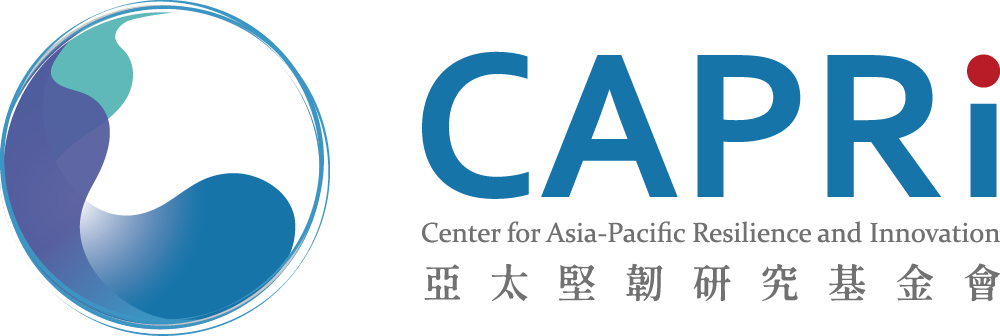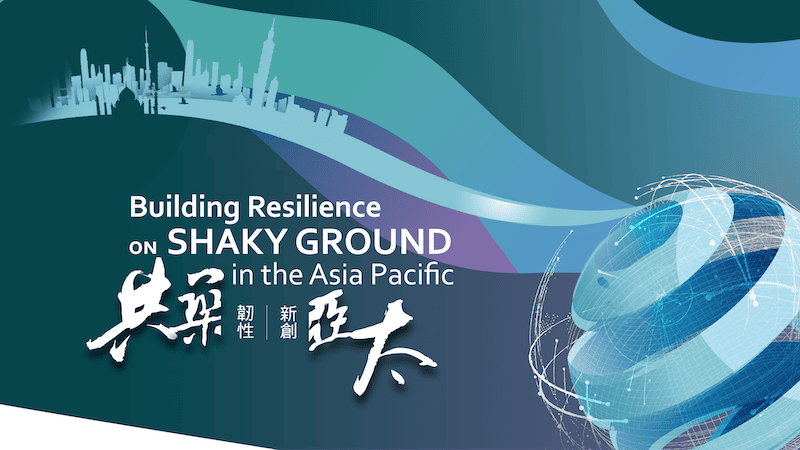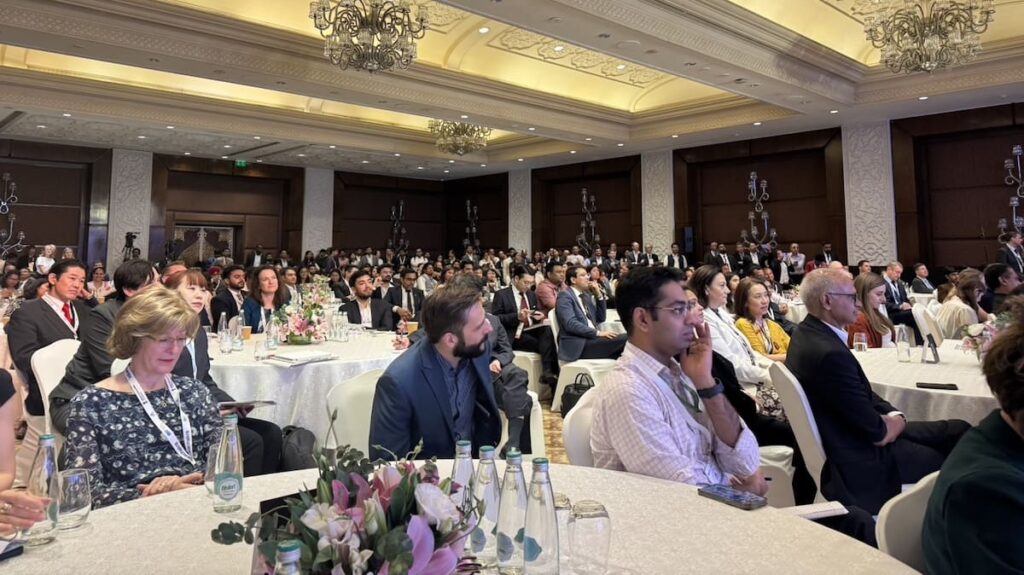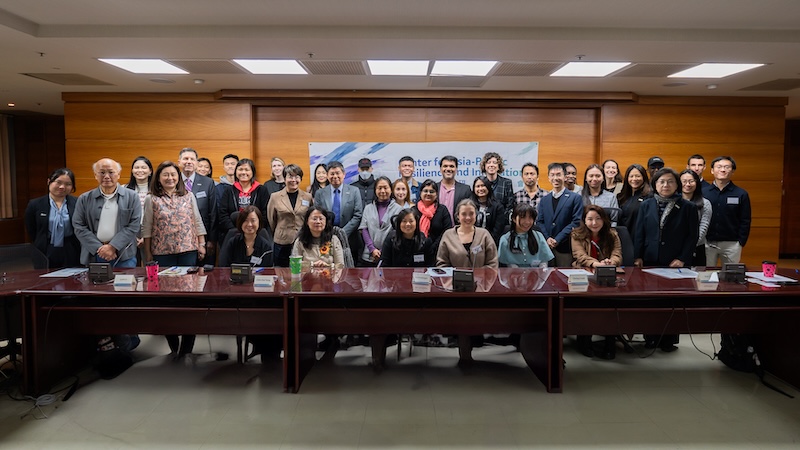As collective public health and climate change challenges have become ever more complex, actors across health, the economy, and the environment still struggle to create a global governance system that can provide sufficient and sustainable solutions.
On day one of The Economist’s Future of Healthcare Week Asia hosted by Economist Impact in Singapore, Syaru Shirley Lin of CAPRI urged us to think bigger. CAPRI’s cross-disciplinary policy research aims to push de-siloing between sectors and foster collaboration in a world entrenched in specialization. Because the challenges of public health, economic growth, and environmental sustainability are interconnected, they must be addressed with innovative ideas through collaborative, interdisciplinary research with academia, the private sector, and policy entrepreneurs.
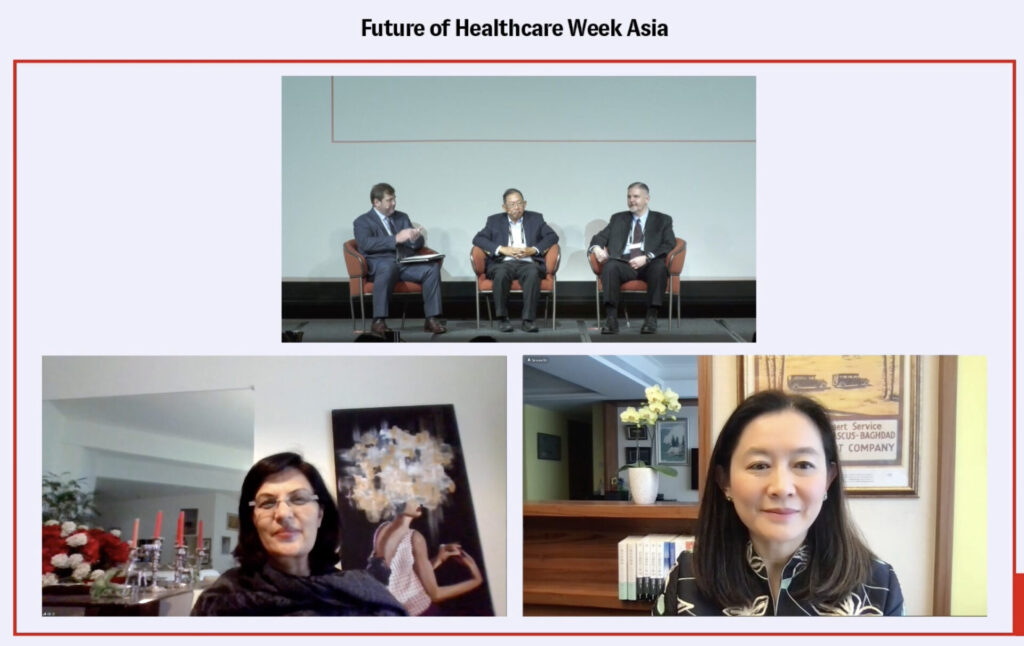
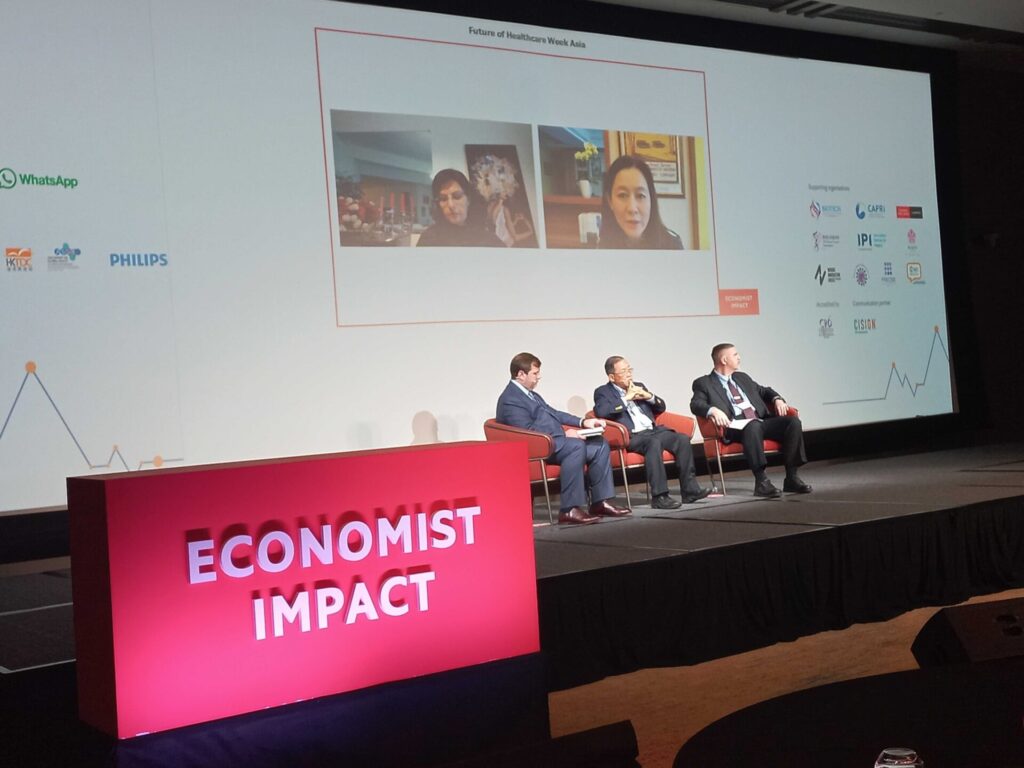
This panel discussion on “Removing Silos for Success in Health” was moderated by David Humphreys (Global Practice Leader, Health Policy at Economist Impact) and other panelists include Dr. Low Cheng Ooi (Chief Technology Officer at Sheares Healthcare Group and Senior Advisor at CMIO Office, Ministry of Health, Singapore), Dr. John Eyres (Director at Office of Public Health and Education, USAID Cambodia), and Dr. Sania Nishtar (Cardiologist and member of the Senate, Pakistan).
Discussion highlights by Professor Syaru Shirley Lin
The pandemic has brought into focus the challenges facing our health systems globally and the role of effective healthcare in keeping our world moving. Back in early 2020, the looming crisis had many decision-makers feeling that they needed to choose between health and the economy. Nearly 3 years on, we now know that population health is a crucial part of our global economy; a healthy population—both physically and mentally—is a productive one. The pandemic has taught that not only do we have to enhance collaboration within single issues such as healthcare or climate change, but that these challenges are interconnected. As an academic in geopolitics teaching in Beijing, Hong Kong, and Charlottesville, Virginia, with a previous business background managing investments for Goldman Sachs, in 2020 I began to realize that implementing cross-sector and cross-country collaboration, as is the aim of SDG 17, is more urgent than ever. This culminated my founding of the Center for Asia-Pacific Resilience and Innovation, or CAPRI, with a group of likeminded scholars to connect challenges in public health, environmental sustainability, and the economy through research on innovative public policy.
Funded by leading private-sector leaders including Fubon Group, Taiwan Semiconductor Manufacturing Corporation, Acer, and MediaTek, CAPRI is an international nonpartisan think tank. It seeks to draw on the Asia Pacific’s networks of academics and experts, business innovators, and international political leaders, including Malcolm Turnbull and Jose Manuel Barroso, to bring forward solutions for the world that can enhance resilience.
When our work started with the global Reform for Resilience Commission in 2021—at a when the world saw large regional differences in the distribution and rollout of COVID-19 vaccines—we set out to bring the global discussion to the Asia Pacific by working from Taipei with a former WHO researcher in London on the challenges in vaccine distribution, manufacturing, and rollout in this region. Fifteen academic, business, political, and international organization leaders across the fields in public health, medicine, technology, law, finance, and public policy contributed to the ideas presented in the resulting report, “Vaccines and the Triple Challenge.” This model of collaboration has become the basis for the research and convening CAPRI now undertakes with Brookings Institution, the University of Virginia, and the World Economic Forum’s Partnership for Health Systems and Sustainability and Resilience initiative (PHSSR).
This PHSSR initiative, of which CAPRI is a founding partner, is another example of breaking down silos to make societies more resilient. Its members, including the WHO Foundation, Philips, KPMG, and AstraZeneca, believe that to create truly sustainable and resilient health systems, it is essential to promote collaboration at the system level among all stakeholders, including government, public and private providers, and healthcare users. The partnership has conducted case studies in more than twenty countries, including Vietnam and Japan, on how their health systems have weathered the COVID-19 crisis. The research is led by the London School of Economics, and CAPRI and will focus on five more countries in 2023, including Singapore, Malaysia, and Taiwan. This research is not done in isolation; the PHSSR uses the research findings to engage with policy makers to bring about change, and comparative work is done with a common framework so that countries can learn from one another.
Another example is CAPRI’s role in coordinating the public health working group of the Democracy in Asia project at Brookings. To understand how the Asia Pacific has fought COVID-19 through innovation while protecting data privacy, CAPRI recruited five public health and legal experts in Japan, India, Australia, Taiwan, and South Korea to write policy memos and do comparative work on data governance in different regions. The experts are meeting in person at Brookings next month as the work is being published, and they will meet policymakers in Washington, D.C. and other Asia Pacific capitals in the coming months.
These projects highlight how the private sector, academics, and government can collaborate to generate innovative ideas for solving policy challenges. New organizations like ours can break down barriers between disciplines, national borders, and specializations.
As discussion of how to improve the health care sector has come to the forefront, the pandemic has also highlighted the link between human and environmental health. Although the world saw carbon emissions decline at the beginning of the pandemic during shutdowns and economic downturn—with reduction estimates ranging between 4% and 7% from 2019 to 2020, the long-term extent to which the pandemic has affected progress toward mitigating climate change is not yet clear. What is clear is that climate change has a significant health cost, which translates to economic consequences. For instance, in the United States, the health costs attributed to climate change and fossil fuel use add up to at least $820 billion per year. And in Europe, over 130,000 people have died because of extreme weather over the last 40 years. Just this week, the WHO reported at least 15,000 deaths in Europe this summer related to unprecedented heat waves.
While climate change must be addressed to improve health, health systems must become greener to combat climate change. Health care is one of the most carbon-intensive sectors worldwide, accounting for as much 4.6% of global emissions. If the global health care sector were a country, it would be the world’s fifth-largest emitter. Future economic prosperity cannot be realized unless health care becomes not only more effective but also more environmentally sustainable.
These challenges are connected, and the Asia-Pacific region is facing them acutely. On the environmental front, the Asia Pacific is most vulnerable to and already experiencing the effects of climate change and extreme weather, with floods, droughts, extreme heat, and other climatic changes already costing the region lives and livelihoods. With nearly one-third of disasters related to weather, climate, and water occurring in this region, the Asia Pacific will be facing the health and economic consequences of climate change head on. From deadly heat waves to sinking islands, the resilience of Asia-Pacific economies and societies relies on the mitigation of climate change.
However, the Asia Pacific lags in decarbonization; a PwC report last year found that the region’s average decarbonization rate in 2020 was only 0.9%, compared with the global average of 2.5% and the required global average of 12.9% per year to reach the 1.5°C Paris Agreement target. Even as COP27 convenes in Egypt this month to discuss solutions to the looming climate crisis, governments and industries in the Asia Pacific and throughout the world do not yet see sustainability as an imperative and opportunity for innovation but rather as a cost and tradeoff with economic growth. The challenges that societies faced in fighting COVID-19—from instituting lockdowns and distributing vaccines to preserving economic growth and maintaining commitments to decarbonization—are challenges of governance. To find solutions, we cannot continue in a business-as-usual way; we need new ideas. Innovation in our thinking comes from breaking down silos, especially among experts who rarely consider others’ perspectives, as their training is highly specialized and entrenched. But neither institutional incentives nor crisis-induced responses alone can encourage de-siloing over the long term. Policy entrepreneurs in the public and private sectors as well as in academia and civil society are needed keep this momentum. As I have realized over the past 18 months of collaborative work through CAPRI, these policy entrepreneurs are thought leaders who want to address interconnected issues and solve problems beyond their own field of expertise. They think big, and we must connect and collaborate with these innovators to formulate strategies for enhancing resilience in the Asia Pacific and beyond.
